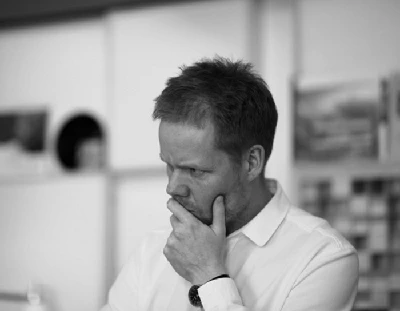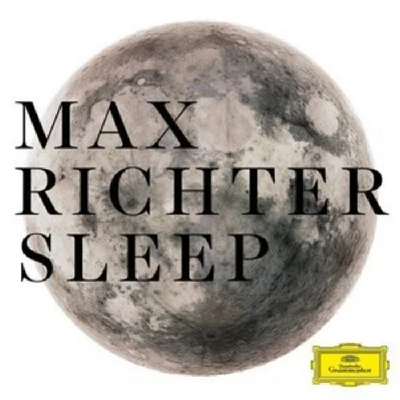published: 25 /
11 /
2015

Maarten Schiethart tries to stay awake to listen to Max Richter's new eight hour composition, 'Sleep'
Article
In its full length, 'Sleep' has been an exclusive performance, presented live in only London, Berlin and Hamburg. 'Sleep' does, however, do wonders to everyone's need to rest. Like refugees you're provided with stretcher beds in order to let a wonderful eight-hour composition played live lull you to dreamland. 'Sleep' counts as one of the greatest achievements ever to evoke a calm sleep.
In its original format, 'Sleep', as well as being eight hours long, consists of 31 tracks. Stretched as they were, over the course of the entire performance, the first few dozen participants listening slept very well, thank you. As today's greatest challenge, 'Sleep' serves as the antidote to a world gone cluelessly frantic. Tiny tinglings of the mind lead one away from everyday distractions. From spleen to sleep marks a matter of a mere night's rest; seven or more hours of unproductive inactivity we call sleep…or counting sheep.
'Sleep' is Max Richter's greatest adventure in composition. Yet only a few among the initiated understood the momentum. Richter's keynotes work like a calm little storm over sleepy lullabies.
The first two hours work indeed like warm chocolate milk with bee honey. Then after, tickling the mind, the first deep sleep is due in. For all I know, these could be moments where greater science should step in. Or hotel servants. At this, either my fifth or sixth attempt to stay awake to closely listen in – that is without any other distraction for the whole eight hours - Richter's immaculate unstrung arrangements strike me once again as wholly appropriate. They lift spirits just as the nocturnal orchestra sets out to be a glowing, mind-expanding experience. Warming to the ears; resonating around the head; ringing in one's subconscious – all these qualities stand out proudly on 'Sleep' like a multi-faceted heaven of beauty in sound.
Ease your mind. Relax your temples. Simply accept that tonight Max Richter is your piano nanny. Built around a theme, in style similar to 'Les Gymnopédies', the revolving chords appear to dig deeper by the hour. Whilst it's true that a certain dream to sleep sequence does exist, it's doubtful if Richter's eight hour score could not be the lullaby to keep your eyes shut and your mind set to rest at peace. This extremely prolonged dream sequence might function like your personal headphone-set as the ultimate chamber music ringing around one's ears. 'Sleep' does exactly what it's supposed to do. Breathe in, breathe out.
To defy yawning , 'Sleep' requires stamina and in its unsymphonic silence it is a dreamy and calm but sturdy experiment. Subdued orchestration and minimalistic submission to melody appear to humble themselves. Underwhelming at the very least, 'Dream', the centrepiece to 'Sleep' , is "whisper music." After three and a half hours, Richter's key notes, in restrained Eric Satie mode, finds a new companion on 'Moth Like Stars' as the mind echoes whirl down.
'Path 17 (Before The Ending of Daylight)' leads to the next phase and by now, you are supposed to be vastly asleep. 'Sleep' has gone only halfway past its first half. The string arrangement, which has become more prominent by the minute, fades away after about twenty minutes.
'Sleep' very much sounds like a new dawning to me. Which makes the album so terribly hard to review. I suppose the background noise of one's personal environment would be the decisive factor of judgement here. 'Sleep' simply will not work if one lives in a noisy neighbourhood like, for example, Manhattan.
Then we enter the second last phase: the whitewash; the minimalistic yet symphonic white noise which defragments the human mind before waking up. Oliver Sacks' passing was only weeks ago, and 'Sleep' is like a neurological experiment set to wonderfully compositional proportions. Richter consulted neurologists before composing this score. Oliver Sacks would have enthused in taking part in this experiment of scientific, social and artistic significance.
The minimalistic creativity designed to put you asleep works to full effect, read: yawn and nod as fully intentional. 'Sleep' encompasses territories which your mind only much later than your ears will be able to trespass. It is impossible to review correctly, since 'Sleep' does the job so well. The listener shall fall asleep at some stage. 'Sleep' will be , if not in the history of performed music, at least an on-line milestone. An eight-hour performance to put the audience to sleep requires not just neurological wisdom and perception, compositional quality and exquisite musicianship, but it too begs for a calming force to halt excitement. I can't think of a more appropriate contradiction in terms: unexcited excitement.
In a nearly baroque manner the last hours descend into dreamy vocal spirals and into more intrinsic theme variations for piano and violin. Like a massage of one's temples, jaws and ears; of one's entire head to be exact, the theme keynotes occur on 'Aria 2' again like the gentlest alarm clock one could wish for. Richter has used science for the sake of his art, like a friendly mould. People in London, Berlin and Hamburg have so far been sleeping together with Max Richter, and, given the eight hours such a performance takes, it seems unlikely 'Sleep' shall be staged on a frequent basis. 'Sleep' demands full concentration from Max Richter and his musicians, if only to stay sharp enough to build the tension towards its last stage, as the string ensemble diverges and meander through the theme to 'Sleep' in order to wind up and to awake the listener.
'Dream 0 (Till Break Of Day)' comes as breakfast. A damp cup of tea; slowly chewing on an apple, stirring a honey yoghurt; it's the finest lazy moment of the day. Good morning!
Band Links:-
http://www.maxrichtermusic.com
https://www.facebook.com/MaxRichterMus
https://twitter.com/maxrichtermusic
Picture Gallery:-
